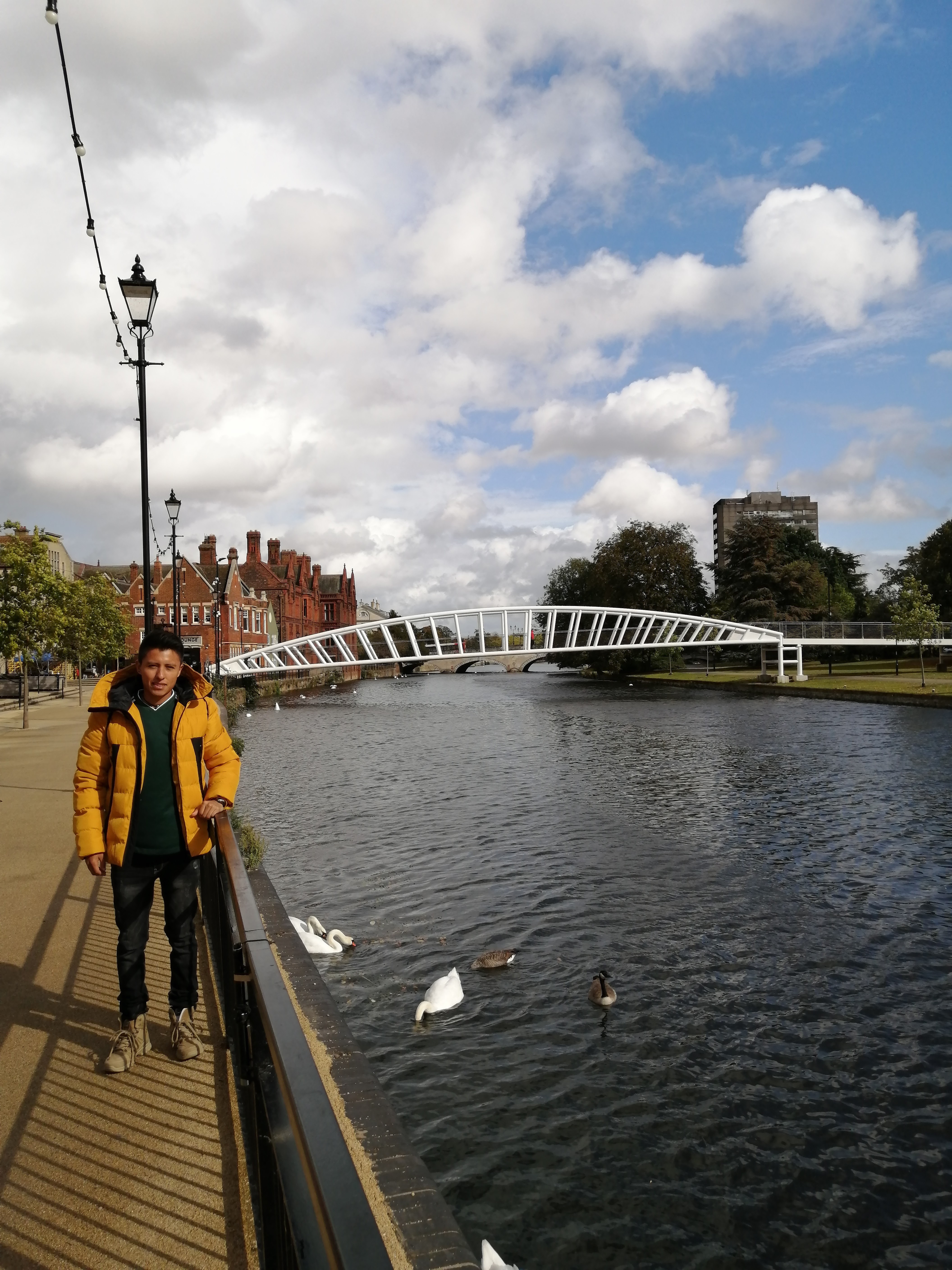

Student Accommodation in the UK
Where do you live when studying abroad? Do universities in the UK offer student housing? How much does student accommodation cost? Did you know that as an international student, you are guaranteed on-campus accommodation for the first or all your years studying at most of our UK universities? You will need to apply by the housing application deadline, and of course the best student accommodation in the UK goes first - so that is a good reason to apply early! There are several different student accommodations, price levels and facilities to choose from!
Most students choose to live on campus in their first year. This is social and a fantastic way to get to know students from all over the world! After that, most students choose to move into privately rented accommodation with their new friends. We recommend everyone to live in university accommodation in their first year, as it is a great way to get to know other students (and not just those on your degree).
Learn more about the different options, on-campus accommodation, how to arrange private accommodation and everything you need before applying for student accommodation in the UK via this webinar!

Visa for European Students who want to study in the UK
Do you want to study in the UK and are wondering if you need a visa? Maybe you have applied to British universities already, or are considering applying to university in London or elsewhere in the UK, but would like to know more about the UK student visa for European students? This webinar recording is about the UK Student Visa for students who will be starting their studies at a British university and are from European countries. We cover everything regarding the CAS, the application process, cost and other practicalities worth thinking about when applying for a student visa.
Did you know that all non-UK students need a visa to study in the UK? How much does a student visa cost? Is it difficult to get a student visa if you want to study in England, Scotland, Wales or Northern Ireland? For most European students in the UK, a student visa is now a fact.
After the UK left the EU, student visas have now become a reality for the vast majority of international students. It is therefore important to familiarise yourself with this process as early as possible, so that you are well prepared when the time comes to submit an application for a student visa. In this webinar recording, we will go through useful information about student visas, when to apply, what you need for the application, costs, and other tips and tricks that can make the process easier. This webinar is suitable for those who have already applied, those who have accepted an offer, but also those who are considering studies in the UK and want to know more about the visa process.
We have the information and tools most people need to be able to go through the visa process without the need for individual follow-up/advice beyond the general information and guide from us. Remember that Across the Pond cannot provide individual advice on your visa application, only certified immigration staff can. In this webinar recording, you will learn about a number of important points that are good to be aware of when you familiarise yourself with the visa process.

My Cranfield experience
My Cranfield journey has been one of the most enriching and valuable experiences I have lived so far. Something that one day seemed unreachable and beyond my expectations, became true.
Everything started with the idea of becoming a more prepared professional, throughout the tools, resources and experience that a master’s degree offers, specially in another country, that allowed me to make an impact in my community and be a positive influence for others.
During my research, at the beginning of the process, I realized that UK was among the countries with better rankings for financial masters, offering a wide variety of programmes and resources that fitted with what I was looking for to continue my personal and professional development.
I have to admit, that the process was not easy at all, but what I can assure, is that it totally worth it. During each of the steps that I was required to complete, and for all the information and queries that arise throughout the whole process, scholarships, documents, interviews, etc. Across the Pond offered me their support, which made everything much easier, compared with what would have been without their aid.
Once I arrived to UK, a whole new world was disclosed for me, discovering new customs, cultures, lifestyle, food, weather, etc. Furthermore, >80% of my classmates were from other parts of the world, outside UK, which made the master more insightful, since it helps you to develop a broader vision, mindsets and learning to work with multicultural teams.
There are countless of memories that I most remember and appreciate, including all the friendships, trips, hangouts, social activities both inside and outside the University, football games, professors, classes, teamwork projects, exams, seminars, thesis, etc. It was like living again old times in a very short period of time, trying to take the fullest advantage of each day.
Something that I found really interesting during that time, was having a closer understanding of the different cultures around the world. Some actions that for one person can be natural and part of their daily life, for other cultures might not be interpreted the same. Among all the activities the University organize, I remember one called “the international week”, where different students from their respective countries coordinate for showing others some of their most traditional dishes, customs, clothes, and anything else that represents them. In my case, we prepared some “tacos of cochinita pibil” (or at least we made our greatest effort for that), being a wonderful experience not only showing others part of your own culture, but also learning from others part of them, beyond of what we can learn from any books or videos.
Finally, what I learnt during that time, was that a master’s degree is not the end of the road, there’s a whole world outside, always something new to learn, and that anything that challenge your comfort zone, will always worth the effort.
- Miguel

Digital meeting with a Student Advisor
Book an online session with an advisor with Across the Pond to learn more about studying in the UK!
- Make sure you book the meeting at least 2 days ahead of time
- If you want to talk over Skype, make sure your Skype is working as it should and that you have connected with your advisor before the meeting starts to avoid losing valuable meeting time
- If you do not use Skype and prefer to talk over for instance Teams, just type that into the "Skype-ID" field and we´ll arrange to send you a meeting link via Teams (you do not need a Microsoft Teams user)

I WANT TO STAY IN THE UK
I studied Engineering at Shanghai University in China, I finished my bachelor’s degree in 2013, after that I went into marketing at a Chinese airline. I went to Kaplan in London to do my pre-master’s course before I started my master's in Investment Management at Cranfield. The pre-master’s course really prepared me for this master’s degree. Some of the modules, like statistics and mathematics really helped me a lot. I chose Cranfield and Kaplan at the same time. Cranfield is a really good university and I wanted to live in London for a short time, I wanted to feel the culture of a big city. So the combination – seven to eight months in London and one year in Cranfield - is really attractive.
When I finished my bachelor's degree, I didn’t know what I was interested in, but with two and half years work experience I realised that I’m interested in finance and I want to get a master’s degree in that. With my education background, it was difficult to get on to a master’s degree because I didn’t have anything related to finance and my English was really bad, so Kaplan gave me an opportunity and helped me improve a lot, mostly in academic skills. After two terms I thought, yes I’m really prepared now, and it’s not that difficult for me here at Cranfield.
My first impression of Cranfield compared to London was that I thought I’d come to a different country. It’s completely different from London. But after one or two weeks here I really feel peaceful and I can really concentrate on the course. In London of course there are a lot of good places to go and I can have a really good time with my friends. But here I can really focus on my master’s.
Travelling
My time here in the UK has been fantastic; there are a lot of opportunities here compared to in China. I've managed to see a little bit of the UK while I've been here. My friends and I rented a car and drove from London to Scotland and the Isle of Skye for six days. One day we started in Edinburgh at 7am and we went to the Isle of Skye, the Highlands and ended in Glasgow at midnight. We realised we should have stayed one night in the Highlands – but we looked on Google maps and it said you could finish this journey in nine hours. I drove thirteen hours that day, it was a bit dangerous. But it was really beautiful, all the lakes. It’s a different beauty than in China, there are less people – it’s like a picture you could see on your calendar, really, really beautiful.
Also I went skydiving in Bunbury – about one hour from London Marylebone by train. I took a six hour course with two instructors and I learned to freefall for 15-20 seconds and opened my parachute at 6,000 feet. We took a plane and we flew above the clouds and I thought this is really exciting, this will be a great story. But after I opened my parachute I realised I couldn’t see my landing field. And there is a radio, but I couldn’t hear them properly – my instructor was trying to tell me to turn left, but all I could hear was “Taoyi, turn …” and it cut out. I was surprised how fast it was, in the movies it doesn’t seem so fast. The first time I landed ok, but the second and third time I landed on my bum! For a qualification I’d have to do it 18 times, but it’s really expensive £2-300 each time, so I don’t think I’ll get my certificate.
Accommodation
I live in couple’s accommodation – I met my girlfriend at Kaplan, she was doing a foundation year there and she went to Birmingham University to study Economics, and at the weekend she comes to visit me or I go to see her.
Going for a PhD
I want to stay in the UK. I’d like to get a PhD and become a lecturer here. I’m hoping to do my PhD in Corporate Finance. I would like to stay in the academic environment, it is quite simple, I think there are more barriers in industry. I’d like to enjoy the balance.
Do you have any advice for students considering postgraduate study?
We approach knowledge in different ways here compared to China. Not only politics and other daily life, I think here, people are more focused on living. They have a better balance between work and life. In China maybe there are too many people and the level of competition is quite harsh. Like me, I tended to focus on work– I didn’t care about my salary or how much overtime I was doing, as long as I had my job I thought I’m OK. Here, people feel satisfied. Of course there are some problems here, like Brexit for example. But there’s a better work-life balance.
- Taoyi

